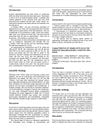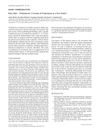 November 2011 in “Journal of Infection”
November 2011 in “Journal of Infection” Many women with HIV in the North of England are diagnosed late and have other health conditions.
 3 citations,
May 2018 in “Experimental Dermatology”
3 citations,
May 2018 in “Experimental Dermatology” Young HS patients often have other physical and mental health issues, and research on HS covers a wide range of topics including genetics, triggers, treatments, and the need for more data.
[object Object] 3 citations,
January 2021 in “Journal of dermatology & cosmetology” Current alopecia treatments manage symptoms but don't cure, and better treatments are needed.
 353 citations,
February 2022 in “Nature Immunology”
353 citations,
February 2022 in “Nature Immunology” Long-haul COVID can cause lasting symptoms affecting many body systems and may be linked to ongoing inflammation and immune system issues.
 April 2023 in “JOJ dermatology & cosmetics”
April 2023 in “JOJ dermatology & cosmetics” The conclusion is that a team of skin doctors and psychiatrists is needed to better treat patients with mind-skin disorders.
 185 citations,
March 2011 in “The Journal of Sexual Medicine”
185 citations,
March 2011 in “The Journal of Sexual Medicine” Finasteride for hair loss can cause long-lasting sexual side effects like low libido and erectile dysfunction.
 35 citations,
January 2004 in “European journal of oncology nursing”
35 citations,
January 2004 in “European journal of oncology nursing” Capecitabine is as effective as intravenous treatments with fewer side effects, but requires careful management of Hand-foot syndrome and patient education.
 34 citations,
April 2014 in “Psychopharmacology”
34 citations,
April 2014 in “Psychopharmacology” Stress and alcohol affect brain chemicals differently in rats, mice, and humans, influenced by genetic differences.
 4 citations,
December 2020 in “Neuropsychiatric Disease and Treatment”
4 citations,
December 2020 in “Neuropsychiatric Disease and Treatment” Women with skin conditions who have body image concerns often experience mental health issues and a lower quality of life.
 2 citations,
January 2021 in “Scandinavian Journal of Child and Adolescent Psychiatry and Psychology”
2 citations,
January 2021 in “Scandinavian Journal of Child and Adolescent Psychiatry and Psychology” Kids with skin problems are more likely to have mental health issues.
 26 citations,
September 2009 in “Psychosomatics”
26 citations,
September 2009 in “Psychosomatics” A girl initially thought to have a psychiatric disorder was later found to have a lupus-related condition, which improved with proper treatment.
 1 citations,
March 2023 in “Nutrients”
1 citations,
March 2023 in “Nutrients” The conclusion is that obesity should be managed with a slow, balanced approach to diet and exercise, with medication and surgery as additional options, and education and access to care are important.
 4 citations,
May 2011 in “PubMed”
4 citations,
May 2011 in “PubMed” Alopecia should be treated as a medical condition because it may increase the risk of serious diseases and psychological issues.
 40 citations,
July 2007 in “Dermatologic Therapy”
40 citations,
July 2007 in “Dermatologic Therapy” Systemic glucocorticosteroids are a primary treatment for various skin conditions but require careful management due to potential side effects and relapses.
 14 citations,
November 2011 in “Journal of The American Academy of Dermatology”
14 citations,
November 2011 in “Journal of The American Academy of Dermatology” Alopecia Areata Incognita causes widespread hair thinning, and treatment with systemic corticosteroids and psychiatric support can lead to remission.
 34 citations,
August 2005 in “Dermatologic Clinics”
34 citations,
August 2005 in “Dermatologic Clinics” Stress and emotional factors can worsen skin conditions by affecting the immune system.
 June 2024 in “Journal of Psychiatry Spectrum”
June 2024 in “Journal of Psychiatry Spectrum” Iron deficiency can cause psychiatric symptoms that improve with proper treatment.
 January 2022 in “Journal of Skin and Stem Cell”
January 2022 in “Journal of Skin and Stem Cell” Trichodynia is a painful scalp condition needing targeted treatments beyond symptom management.
 January 2020 in “Fertility and Sterility”
January 2020 in “Fertility and Sterility” The conclusion is that it's currently unclear if certain rare medical conditions are caused by specific factors due to mostly observational data.
 22 citations,
May 2011 in “American Journal of Clinical Dermatology”
22 citations,
May 2011 in “American Journal of Clinical Dermatology” Recognizing and managing skin-related psychiatric disorders in children is crucial for effective treatment.
 532 citations,
August 2011 in “Journal of the American Academy of Dermatology”
532 citations,
August 2011 in “Journal of the American Academy of Dermatology” Vitiligo is a skin condition causing white spots, more common in women, often starts before age 20, and can affect mental health.
 26 citations,
January 2017 in “Acta dermato-venereologica”
26 citations,
January 2017 in “Acta dermato-venereologica” Antidepressants might help with skin inflammation and improve conditions like psoriasis and eczema.
 3 citations,
January 2010 in “Actas Dermo-Sifiliográficas”
3 citations,
January 2010 in “Actas Dermo-Sifiliográficas” Psychotropic drugs can help treat skin conditions affected by mental health, but dermatologists must use them carefully due to side effects and patient concerns.
January 2022 in “Clinical Cases in Dermatology” A man has a common skin condition called seborrheic dermatitis, treated with special shampoos and sometimes medication.
 April 2016 in “Journal of The American Academy of Dermatology”
April 2016 in “Journal of The American Academy of Dermatology” Different treatments are effective for hair loss conditions, but results vary by individual factors.
19 citations,
January 2011 in “International journal of trichology” A 3-year-old boy had a rare hairball condition usually seen in teenage girls.
 9 citations,
January 2013 in “Acta dermato-venereologica”
9 citations,
January 2013 in “Acta dermato-venereologica” The conclusion is that "trichoknesis" should be recognized as a separate condition from trichodynia, characterized by itching instead of pain.
 2 citations,
July 2005 in “Baylor University Medical Center Proceedings”
2 citations,
July 2005 in “Baylor University Medical Center Proceedings” A 4-year-old girl was diagnosed with trichotillomania, a condition where she pulls out her hair, which may resolve on its own or require therapy.
 June 2023 in “British journal of dermatology/British journal of dermatology, Supplement”
June 2023 in “British journal of dermatology/British journal of dermatology, Supplement” Two sisters with lipoedematous scalp suggest a genetic influence in the condition.
[object Object]  April 2023 in “Journal of Investigative Dermatology”
April 2023 in “Journal of Investigative Dermatology” People with Lichen sclerosus are more likely to have skin conditions like vitiligo and alopecia areata, heart disease risks, and other health issues. They should be checked for these, but screening plans shouldn't differ based on gender due to lack of data.



























